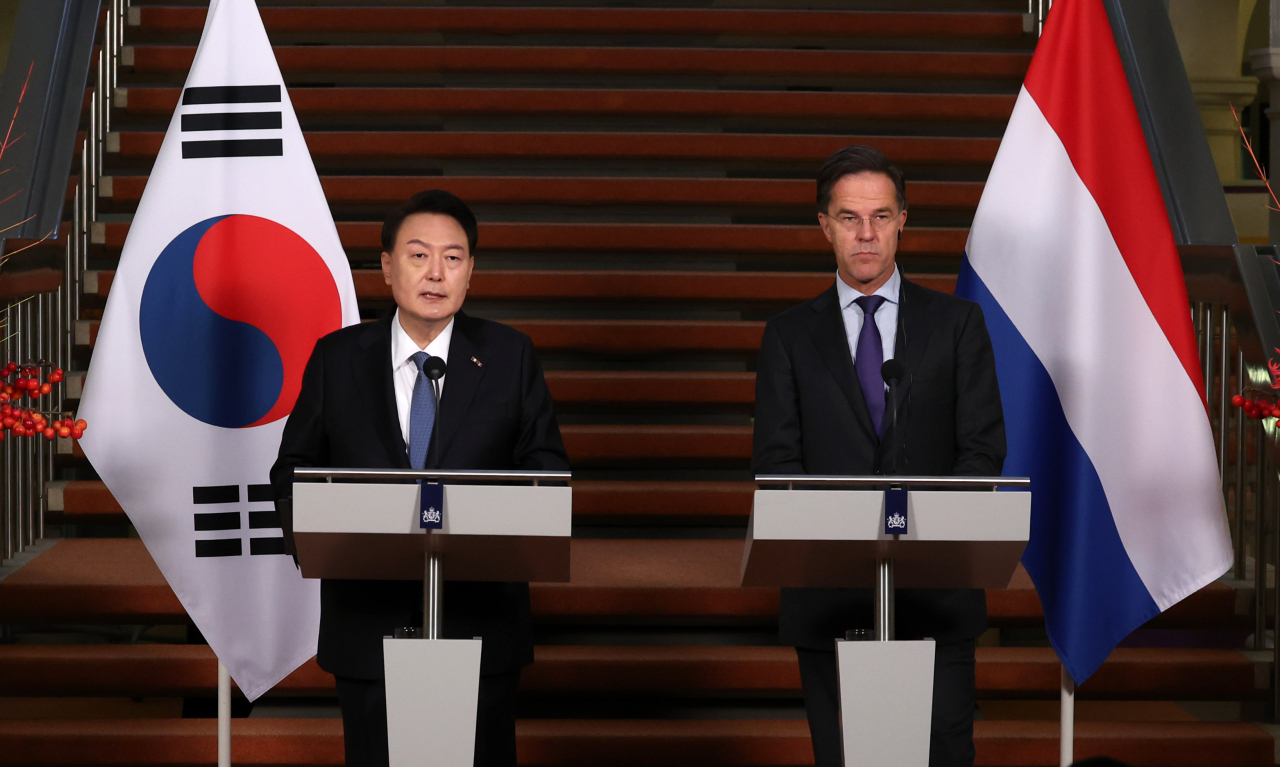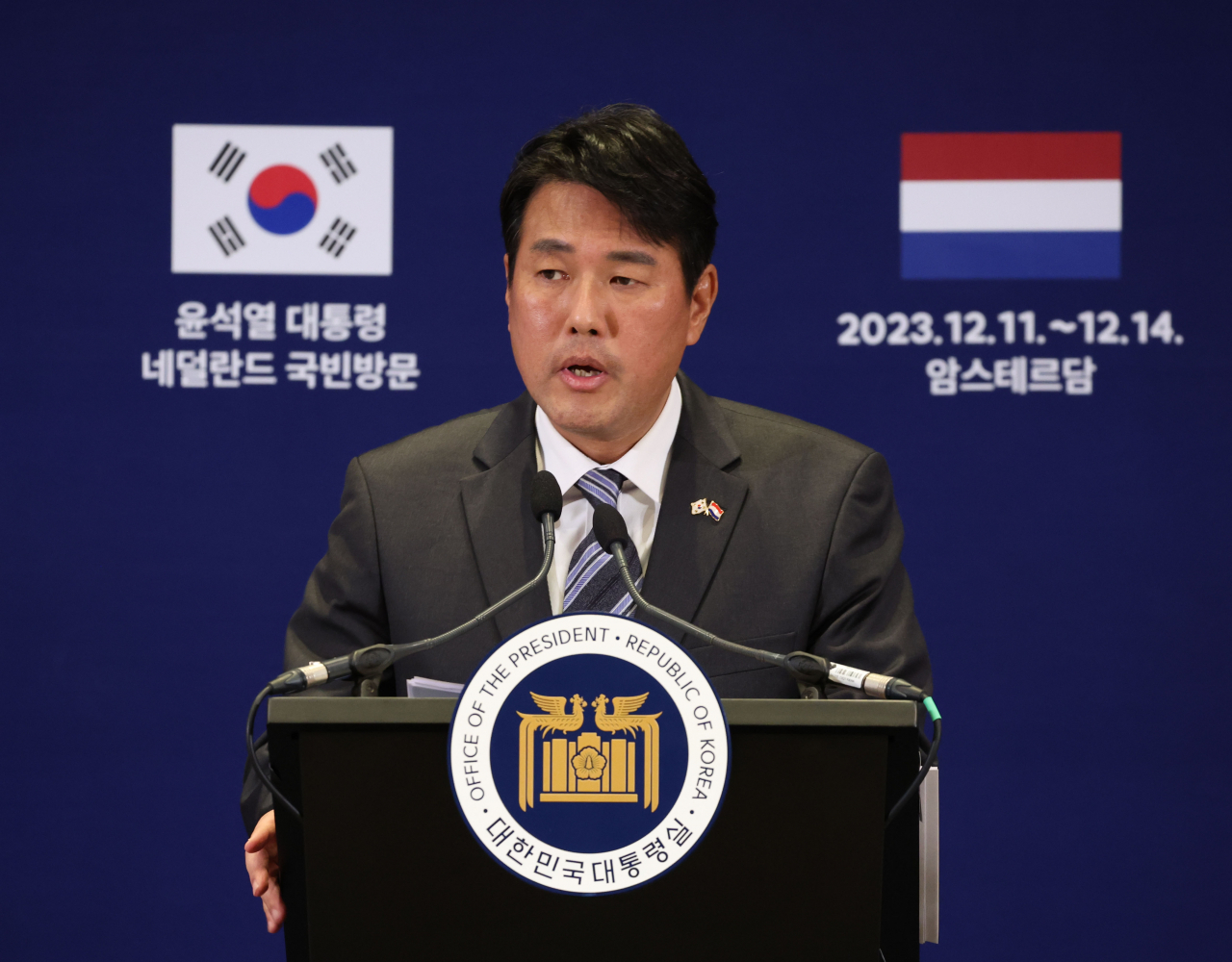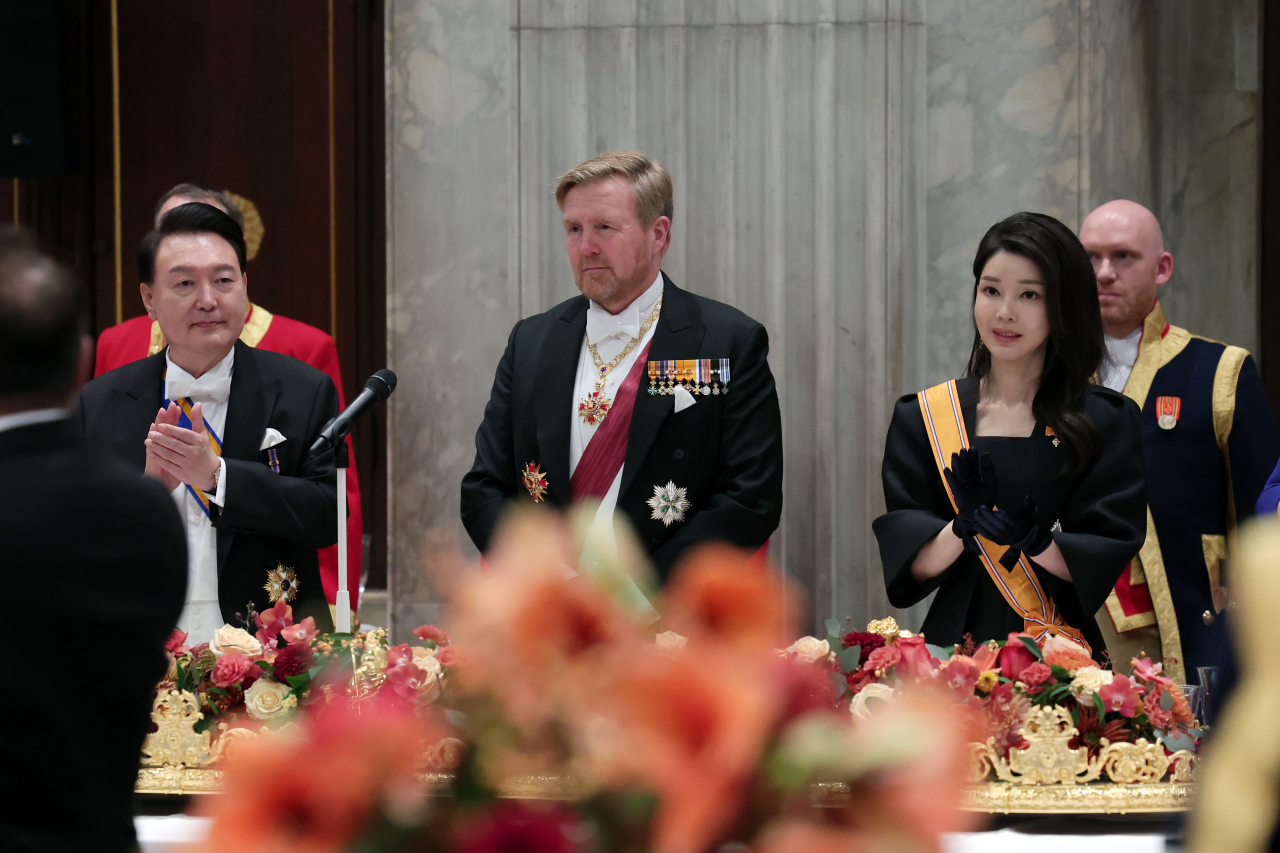S. Korea, Netherlands declare 'semiconductor alliance'
By Son Ji-hyoungPublished : Dec. 13, 2023 - 15:19

South Korea and the Netherlands on Wednesday announced a "semiconductor alliance" under which the two countries will join forces to strive for chip supremacy and overcome chip supply chain disruptions due to geopolitical tensions.
The announcement came as President Yoon Suk Yeol and Dutch Prime Minister Mark Rutte met in The Hague on Wednesday and signed three memoranda of understanding, including one on intergovernmental cooperation to ensure chip supply chain stability.
"Both leaders recognized their unique and complementary position in the semiconductor value chain, and reaffirmed their commitment to build a semiconductor alliance encompassing the participation of governments, businesses, and universities," the joint statement read.
"We have upgraded the bilateral semiconductor ties from cooperation to alliance," Yoon said at the press conference with Rutte. "When we talk about allies, they are the ones sharing sensitive information and strategies. ... South Korea and the Netherlands will jointly maintain chip supremacy and develop cutting-edge technologies, while sharing critical issues about chip-related science and technology."
Yoon added that the two countries will work together to nurture the future generation of semiconductor engineers, innovate key components in the chip supply chain and address supply chain vulnerabilities.
Before the declaration, Kim Tae-hyo, first deputy chief of the presidential National Security Office, told reporters ahead of a summit between Yoon and Rutte that the expression "chip alliance" was to be stipulated to describe the relations between Seoul and Amsterdam in the joint statement. Yoon is currently on a state visit to the Netherlands.
Touting the "unprecedented form of alliance," Yoon's office said that the two countries would establish an economic security dialogue of foreign ministries, a dialogue of industry authorities concerning semiconductor-related policies, as well as a consultative body over the bilateral chip supply-chain cooperation.
These moves will "accelerate the formation of a chip alliance between the two countries," Kim said, adding the alliance would "bring the two countries' semiconductor ecosystems closer as one's ecosystem relies on the other."
Science Minister Lee Jong-ho told reporters Tuesday the alliance will allow Seoul to "act with greater flexibility" so that South Korean chipmakers will be given a greater chance of securing Dutch machines when they need them.

South Korean chipmakers Samsung Electronics and SK hynix rely on Dutch microchip printing equipment, as the machines are crucial for manufacturing the most advanced chips -- including Samsung's most advanced 3-nanometer process -- suitable for next-generation consumer electronics goods. In the meantime, their sluggish recovery in the sales of semiconductors, which account for about 20 percent of all South Korean exports, is affecting national export recovery.
On the other hand, Dutch exports to South Korea rose 97 percent to 8.6 billion euros ($9.3 billion) from 2019 to 2021, offsetting the impacts of Brexit and a war in Ukraine. Moreover, 19 percent of Dutch specialized machinery exports went to Korea in 2019, the second-largest amount after Taiwan.
The chip alliance comes at a time when Dutch semiconductor suppliers began restricting the sales of their chipmaking tools to China starting in June, siding with the United States which has been implementing export curbs of high-tech components on China citing security concerns.
One of the Dutch companies, semiconductor lithography equipment supplier ASML, saw some of its lithography machines affected by the export restrictions. ASML also projected a halt in annual revenue growth in 2024 amid chipmakers' uncertain prospects.
The joint declaration Wednesday in Amsterdam was to be followed by three memoranda of understanding signed Tuesday between the governments and industry players.
The agreements, signed at the headquarters of ASML in Veldhoven, the Netherlands, stipulate that a total of 500 aspiring chip engineers from two countries together are to go on a field trip to Dutch semiconductor industry facilities.
A deal between Samsung Electronics and ASML enshrines a 1 trillion won ($760 million) joint project to build a research center and develop a new chip-printing technology.
Science Minister Lee, formerly a computer engineering professor at Seoul National University, said that it was unlikely that South Korea would be capable of independently manufacturing chip-printing machines as a result of the deal.
Memory chipmaker SK hynix also signed an agreement with ASML jointly to develop a new technology aimed at minimizing electricity consumption when using ASML's most advanced extreme ultraviolet lithography machine. Approximately 16.5 billion won in cost savings are expected each year once the technology comes to fruition, according to Yoon's office.

A day before the summit, Yoon and first lady Kim Keon Hee attended a state banquet at the Royal Palace of Amsterdam hosted by King Willem-Alexander. Among them was Guus Hiddink, who was the head coach of the South Korean men's national soccer team in 2002, when the team made it to the semifinals of the World Cup.
Yoon said in his remarks that bilateral trade volume reached $16 billion by value in 2022, and that trade ties would continue to prosper in a wider range of fields such as semiconductors, nuclear power, artificial intelligence and digital transformation.





![[KH Explains] No more 'Michael' at Kakao Games](http://res.heraldm.com/phpwas/restmb_idxmake.php?idx=644&simg=/content/image/2024/04/28/20240428050183_0.jpg&u=20240428180321)













![[Herald Interview] Mistakes turn into blessings in street performance, director says](http://res.heraldm.com/phpwas/restmb_idxmake.php?idx=652&simg=/content/image/2024/04/28/20240428050150_0.jpg&u=20240428174656)
